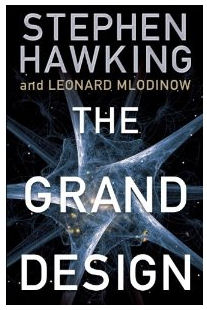





by Stephen Hawking & Leonard Mlodinow

Reviewed by Theresa Welsh
Our Universe, Explained...In this small book, Hawking and Mlodinow attempt to explain to us in understandable language, peppered with a dry humor, the grand design of the universe... our universe, that is. We learn that the laws operating in our universe make it possible for life to form, and that if any one of a number of factors had been just a bit different, life could not have formed. While this remarkable set of conditions, perfect for developing complex life forms such as ourselves, may make it seem that there must have been a Designer who set in motion these perfect conditions, we are told that is not the case. Why not? Well, how about all those other universes that may have completely different conditions and therefore no life forms? If ours is just one among many, than it is not remarkable that our universe began with its particular initial conditions. How do the authors know there are other universes? The investigation physicists have been making into the laws of our universe lead them to that conclusion. I'm going backward here from the premise with which this book begins, which is seeking answers to the Big Questions we all have, such as "Why is there something rather than nothing?" "Why do we exist?" "Why this particular set of laws and not some other?" Philosophy is Dead?These are the questions of philosophy, but the authors make a remarkable statement on the very first page, stating that "philosophy is dead..."and it is up to physicists to give us answers, although many people take these questions to religious leaders, who generally endorse the idea of a Creator God. But scientists have been whittling away at all the features of our world that seem to indicate a Designer by showing us how those features are a product of the laws built into our universe. Don't laws require a Lawgiver? Well, no, they don't. Laws can just exist, and their existence is proven by experiments carried out by physicists. Very tiny objects (the components of atoms) behave differently from large bodies, so Newtonian physics works at the macro level, but does not hold true at the micro level. What appears to us (we are made up of trillions of atoms, so we operate on the "large body" level) to be so is not so when we look at sub-atomic particles. In other words, our senses are a poor roadmap of reality. The Craziness of Quantum PhysicsThe book travels through many of the recent discoveries and theories of modern physics, including the double-slit experiments with particles, showing interference patterns that seem to indicate particles can be in two places at once, and the effect of the observer on what he is observing. So much of quantum physics feels contrary to common sense. But "common sense" is a product of what we see and experience and this is unreliable when it comes to understanding our universe. While scientists have struggled to pull all the laws together into some kind of unified picture, the authors point to what is called "M-theory" which is an overall set of principles for universes, and which allows for different universes, each with its own laws. While the laws that operate in a universe cannot have exceptions, they are unique to that universe. The authors discuss the various ideas about the number of dimensions required for a universe, and how this affects the kind of universes that might exist. M-Theory — Not Very SatisfyingAt this point I have to admit that much of this was tough going, and I still don't quite understand M-theory or how universes can pop up from nothing. But I applaud Hawking and Mlodinow for making the effort to explain it. Hawking is, of course, a superstar in the science world, and his previous books have informed and entertained millions of readers. Those of us who care about these questions need to know what scientists are finding, and I wanted to know what Stephen Hawking thinks about these matters. This book is well-written, with examples and illustrations; but the subject matter, while fascinating, is not always easy to grasp. If philosophy is really dead as a field of study and religious leaders fall back on "it's a miracle," then who can help us find the answers? Should we accept scientists like Stephen Hawking as our 21st century philosophers? Maybe, but the conclusions in The Grand Design leave me still confused and unsatisfied. M-theory is not a very sexy - or understandable - answer. Perhaps "M" stands for "mystifying." It seems none of the theories about how our universe, or any other universe, came to be make much sense, but this book has at least given me a better understanding of how physicists are going about looking for those big answers. Although Hawking and Mlodinow tell us the universe behaves as it does because of its own internal laws, they refrain from disparaging or ridiculing (as some other scientists turned popular authors have done) a belief in God. But they clearly endorse the idea that everything can be explained without resorting to God as a final answer to those big questions. A lot of the hype about this book has centered on the seeming rejection of any place for God in the creation and evolution of the universe, but the authors fall far short of actually rejecting the idea of a Creator... or of convincing anyone that they have supplied us with answers to the questions they posed on the first page. Click this link to go to the amazon.com page for this book: |
|

|
 |